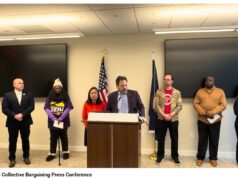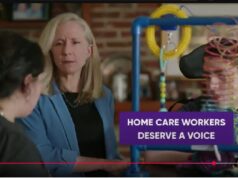by Thomas Bowman, a partner with Resolute Strategies Group, a Democratic strategic consulting firm
During the last two years as the Virginia lobbyist for the Mid-Atlantic Laborers International Union of North America (LiUNA), I got an inside look at how unions work, what they do right, how they can help business and what they do wrong.
Unions are the only mechanism in a free-market economy to check business’s tendency to reward their shareholders before helping their workers. Destroying the right to organize destroyed the middle class.
Empowering labor is a free-market way to attack income inequality and grow the middle class. Union membership peaked in the mid-1950s, when over 30 percent of workers were union members. During that era, the top 10 percent owned around 35 percent of the wealth. Overall union membership has since declined to less than 15 percent of households, and the top 10 percent owns over half of all wealth.
In addition to advocating for better wages, benefits, and working conditions, unions also advocate for other popular Democratic policies, including redistricting reform, LGBTQ and gender equality protections, and universal pre-k.
Union political contributions and organizing are behind recent Democratic victories. When non-union companies make money, they donate to Republicans and advocate for pro-business policies. When union companies make money, they contribute to Democrats who advocate for policies that help average people. That makes action on other Democratic priorities more likely, such as climate change, gun violence prevention, and electoral reforms.
However, it is not all roses. I found organized labor struggles to keep up with how the modern economy works. Too many unions are preoccupied with fighting with other unions for a shrinking share of the overall marketplace while the gig economy continues to grow.
According to the Economist, half of all jobs will automate over the next 20 years. Jobs safe from automation include C-level and low-skilled jobs like janitors. If you work in a middle-skill job like construction, a bank teller, customer service rep, business administration or similar field, you are going to have your job automate in the next 20 years. Middle-skilled workers are more likely to become another Uber driver or janitor than they are a C-suite executive.
Labor should organize middle-skilled jobs, but they do not understand the industries. Labor thinks it is impossible to organize those industries because they cannot organize people who often work from home. Decades of nepotism and in-network hiring has contributed to this lack of understanding.
While they may not be able to send an organizer, labor could use targeted digital advertising and spend resources on modern communication and advocacy techniques.
Decades of anti-labor policies and stagnation left unions poorly positioned to face the modern economy. It does not help that southerners are conditioned to distrust labor. This is by design. During the Jim Crow era, labor unions advocated for equal wages for people of color. White people did not like the idea of racial equality so white elites embarked on a vociferous anti-union PR campaign. If you work for Amazon, this prejudice keeps you poor and makes Jeff Bezos richer.
Bad jobs can become good jobs if they are unionized. Good jobs mean good wages and good wages mean higher payroll withholdings for governments. Higher tax revenues mean less pressure on budgets and more money for roads and schools.
Unions also help small and medium-sized businesses compete with big business by supplying world-class healthcare and retirement plans to their members so signatory businesses do not have to. That lets small businesses pay workers more and keep employees.
There are also political advantages for businesses who work union. Most unions contribute heavily to Democrats and ask public officials to promote the industries they represent. Now that Virginia is blue for the near future, working union is a simple business decision.
For example, a company can deputize labor to support their projects. By signing with local unions, a company can have a built-in advocacy network for their projects.
Soon Donald Trump will leave, and Democrats will have to run on their record. Without strong unions in the South, the pendulum will swing back, and the Republican Party will return. The General Assembly should pass pro-labor reforms so unions can stop the bleeding and start focusing on how to save your job from algorithmic slavery.









![[UPDATED 1/29/26] Audio: Sen. Tim Kaine Talks to Blue Virginia About His “Five-Point Plan” to Fight Trump’s Orban-Like Assault on US Democracy; Civil Disobedience a la MLK Jr.; Trump’s Bogus “Energy Emergency”; the Crucial Importance of the 2025 VA Elections; etc.](https://bluevirginia.us/wp-content/uploads/2025/02/kaineinterview2-100x75.jpg)

